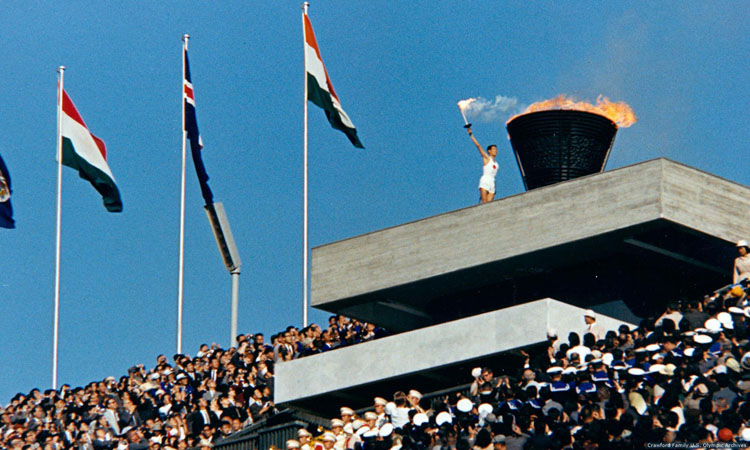Comment
The Tokyo Olympics before the time of corona
Thursday 16 April 2020
 Coronavirus has killed more than 100,000 people and forced the 2020 Tokyo Olympics to be postponed until summer next year. I pray that a handful of old pensioners, members of the Reuters team that covered the 1964 Tokyo Olympics, will still be around by then.
Coronavirus has killed more than 100,000 people and forced the 2020 Tokyo Olympics to be postponed until summer next year. I pray that a handful of old pensioners, members of the Reuters team that covered the 1964 Tokyo Olympics, will still be around by then.
Hong Kong businessman CP Ho, a Reuters correspondent in the former British crown colony in the 1950s and 60s, passed through London two years ago and invited three old Asia hands - John Ransom, Adam Kellett-Long and me - to lunch at a Covent Garden restaurant.
Talking about old times and departed friends, we realised that three of us – Adam, CP and I - are among the last surviving members of the 1964 Reuters team. The only others that I know of are David Lawday, who lives in France, and William Gasson and his wife Anne who live in New Zealand. Anne and Adam’s wife Mary took phoned copy from reporters during the games.
The 1964 Olympics were the first held in Asia. David Chipp led the Reuters team which included Vernon Morgan, Reuters legendary sports editor who competed for Britain in the 3,000 metres steeplechase at the 1928 Amsterdam Olympics. At Oxford he won blues in athletics, cross-country and football.
Vernon and I went to a press conference called by Indonesia, which was then waging “konfrontasi”, an undeclared war against Malaysia and Britain largely fought in the jungles of Borneo. Outside the Indonesian embassy Vernon, Reuters sports editor for more than 30 years, stopped to ask me if he should take off his British pin. I told him to keep it on. Even without a pin Vernon’s bearing and manners made him stand out as an Englishman.
Allan “The Sarge” Barker came from New York with a present for everybody - a fat envelope of US newspaper cuttings about the sport each reporter was assigned to cover. In those pre-Google days (34 BG), Allan’s cuttings containing sports records and biographical data were invaluable. It was his idea to collect them for the team.
The London contingent included John Davis, Nick Carter, Harry Kerly, Dick Streeton and Claude Richardson, Reuters’ horse-racing pundit.
Kevin Garry, Reuters chief representative in Japan, and Gasson, correspondent in Tokyo, did the advance work. Japanese university students were hired as interpreters, including Masaki Watanabe who later joined the 1966 intake of Reuter trainees in London. His father was for many years a top executive in the Japanese news agency Kyodo.
The 1964 Olympics were the last to use a cinder running track for athletic events and the first to use fibreglass poles for pole vaulting. It was the first time South Africa was barred from taking part due to its apartheid system in sports.
I covered basketball, watching four games a day from 10 am to 6 pm for two weeks, breaking only for a packed lunch of cold fried chicken from the Olympic Village cafeteria. The United States beat the Soviet Union to win their sixth straight basketball gold medal. Brazil beat Puerto Rico for the bronze medal.
At the 1980 Moscow Olympics I was able to watch a wider range of sports without writing a word because London-based Reuter journalists went on strike in support of colleagues in New York. It was the first journalists’ strike in the history of Reuters. Garry, by then staff manager at Head Office in London, negotiated with the union and joined other executives in putting out a skeleton news service.
In Tokyo, Australian swimmer Dawn Fraser won the 100 metres freestyle event for the third time in a row. American Joe Frazier, future heavyweight champion of the world, won a gold medal in heavyweight boxing while competing with a broken thumb.
Abebe Bikila of Ethiopia became the first person to win the Olympic marathon twice. Zambia, formerly Northern Rhodesia, declared its independence on the day of the closing ceremony. It was the first to have entered the Olympics as one country and left as another.
The 1964 Olympics were the first to be telecast internationally via satellite. Next year, God willing, I will happily self-isolate and stay at home to watch the 2020 Tokyo Olympics on TV.
Photo: The 1964 Olympic cauldron was lit by Yoshinori Sakai who was born in Hiroshima on 6 August 1945, the day an atomic bomb was dropped on that city. ■
- « Previous
- Next »
- 396 of 1808